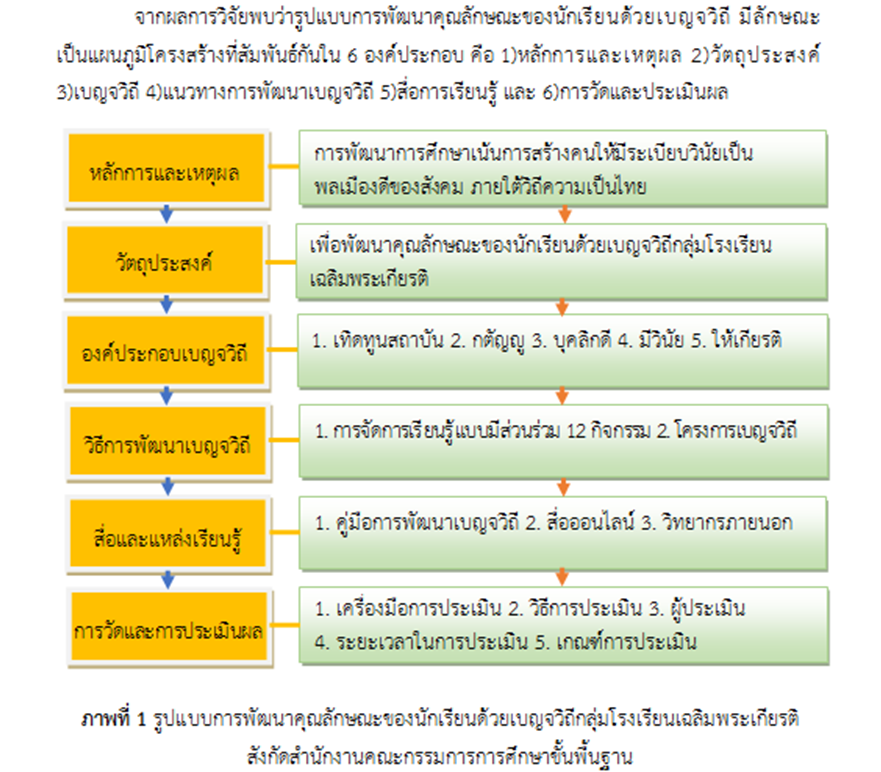DEVELOPMENT OF BENJAWITHEE MODEL AT CHALERMPRAKIAT SCHOOL GROUP UNDER THE OFFICE OF THE BASIC EDUCATION COMMISSION
Main Article Content
Abstract
This research aimed to 1) study components, indicators and guidelines for development student characteristics with Benchawithi, 2) to create a model for the development student characteristics with Benchawithi. The researcher conducts research according to the research and development process. The research consisted of four steps as follows: Step 1: Study elements, indicators and guidelines for developing student characteristics with Benjavithi by studying research papers. and study visits to 3 model schools. Step 2: Create a model for developing students' characteristics with Benjawithi, assessed by experts, and 15 experts. Instruments of this research were 1) the data record from 2) the study record from 3) the suitability assessment from. The statistics used in the research were percentage, mean and standard deviation.
The results of the research were found that; 1. student characteristics with Benchawithi, there were 5 elements, 19 indicators as follows: component 1, honoring the institute with 4 indicators; The third element indicates good personality, 4 indicators, element 4, discipline, 5 indicators, element 5, honor modesty, there are 5 indicators. 2. The development student characteristics with Benchawithi is characterized by a structured diagram that relates to 6 elements: 1) Principle and Rationale. 2) Objectives 3) Benjawithi 4) Benchawithi development approach includes 7 driving activities and 1 supporting activity 5) learning materials and 6) measurement and evaluation. There are two approaches comprising an integrated activity and a project to promote student characteristics with Benjavithi, and the model evaluation results showed that student characteristics with Benchawithi of Overall suitability are at a high level, and there are overall possibilities at a high level.
Article Details

This work is licensed under a Creative Commons Attribution-NonCommercial-NoDerivatives 4.0 International License.
References
คณะกรรมการพัฒนาเศรษฐกิจและสังคมแห่งชาติ. (2555). แผนพัฒนาเศรษฐกิจและสังคม ฉบับที่ 11. กรุงเทพมหานคร : สำนักงานพัฒนาเศรษฐกิจและสังคมแห่งชาติ.
ชัยนิตย์ พรรณาวร และรุจิร์ ภู่สาระ. (2556). การพัฒนาหลักสูตรการเป็นพลเมืองที่ดี สำหรับเยาวชน.สืบค้นเมื่อ 15 ธันวาคม 2562. จาก https://www.academia.edu/10262587/The_ Development_of_Training_ Programs_For_Good_Youth_Citizens
ทวีศักดิ์ จินดานุรักษ์. (2560). ครูและนักเรียนในยุคการศึกษาไทย 4.0. การศึกษาไทยยุค 4.0 ให้เรียนในสิ่งที่ชอบ. กรุงเทพมหานคร : มหาวิทยาลัยราชภัฏจันทรเกษม.
นพดล เด่นดวง. (2560). การประเมินโครงการตามแนวทางเบญจวิถีเพื่อเสริมสร้างคุณลักษณะความเป็นสุภาพบุรุษสุภาพสตรีของนักเรียนโรงเรียนกาญจนาภิเษกวิทยาลัย นครปฐม (พระตำหนักสวนกุหลาบมัธยม). นครปฐม : โรงเรียนกาญจนาภิเษกวิทยาลัย นครปฐม.
บุญชม ศรีสะอาด. (2554). การวิจัยเบื้องต้น. พิมพ์ครั้งที่ 9. กรุงเทพมหานคร : สุวีริยาสาส์น.
ประไพรัตน์ ลำใจ. (2557). รูปแบบการพัฒนาคุณธรรม จริยธรรม นักเรียนระดับมัธยมศึกษา.วิทยานิพนธ์ปริญญาดุษฎีบัณฑิต สาขาวิชาการบริหารจัดการการศึกษา. พระเยา : มหาวิทยาลัยพะเยา.
ปรีชา การสอาด. (2560). การพัฒนารูปแบบการประเมินการจัดการเรียนรู้เพื่อส่งเสริมทักษะชีวิตในศตวรรษที่ 21 ของนักเรียนระดับมัธยม. วิทยานิพนธ์ดุษฎีบัณฑิต สาขาวิชาการบริหารจัดการการศึกษา. มหาสารคาม : มหาวิทยาลัยราชภัฏมหาสารคาม.
ปาริชาติ ธีระวิทย์. (2561). รายงานวิจัยเรื่องการส่งเสริมคุณธรรมจริยธรรมที่มีประสิทธิภาพ:กรณีศึกษากลุ่มเด็ก/เยาวชนและช้าราชการภาครัฐ. กรุงเทพมหานคร : กรมการศาสนา กระทรวงวัฒนธรรม.
ไพศาล วรคำ. (2559). การวิจัยทางการศึกษา. มหาสารคาม : ตักสิลาการพิมพ์.
เยาวดี รางชัยกุล วิบูลย์ศรี. (2548). การประเมินโครงการ : แนวคิดและแนวปฏิบัติ. กรุงเทพมหานคร : สำนักพิมพ์แห่งจุฬาลงกรณ์มหาวิทยาลัย.
รัตนะ บัวสนธ์. (2554). การวิจัยและพัฒนานวัตกรรมทางการศึกษา. กรุงเทพมหานคร : สำนักพิมพ์จุฬาลงกรณ์มหาวิทยาลัย.
ราชบัณฑิตยสถาน. (2556). พจนานุกรมฉบับราชบัณฑิตยสถาน พ.ศ. 2542. กรุงเทพมหานคร : นานมีบุ๊คส์พับบลิเคชั่น.
สถาบันพระปกเกล้า. (2558). พระบาทสมเด็จพระปกเกล้าเจ้าอยู่หัวกับแนวพระราชดำริด้านการปกครองท้องถิ่น. กรุงเทพมหานคร : สถาบันพระปกเกล้า.
สำนักงานเลขาธิการสภาการศึกษา. (2560). แผนการศึกษาแห่งชาติ พ.ศ. 2560. กรุงเทพมหานคร : กระทรวงศึกษาธิการ.
สิริวรรณ ศรีพหล. (2559). รายงานการวิจัยการพัฒนาชุดฝึกอบรมทางไกลสำหรับครูสังคมศึกษาเรื่องการจัดการเรียนการสอน วิชาพระพุทธศาสนาในสถานศึกษา. นนทบุรี : สำนักพิมพ์มหาวิทยาลัยสุโขทัยธรรมาธิราช.
สุทธิวรรณ ตันติรจนาวงศ์ และศศิกาญจน์ ทวิสุวรรณ. (2552). การส่งเสริมคุณภาพที่มีประสิทธิภาพ: กรณีศึกษา กลุ่มเด็ก/เยาวชนและข้าราชการภาครัฐ. กรุงเทพมหานคร : กระทรวงวัฒนธรรม.
สุระ อ่อนแพง และนงลักษณ์ วิรัชชัย. (2556). รูปแบบการบริหารเพื่อพัฒนาคุณธรรมจริยธรรมนักเรียนระดับประถมศึกษาในสถานศึกษา สังกัดสำนักงานเขตพื้นที่การศึกษาประถมศึกษา. วิทยานิพนธ์ปริญญาดุษฎีบัณฑิต สาขาวิชาการศึกษา. คณะศึกษาศาสตร์ :มหาวิทยาลัยนเรศวร.
Abowitz and Harnish. (2006). Contemporary Discourses of Citizenship, in Review of Educational Research 2006. Retrieved 15 December 2019. From https://social. crru.ac.th/activeLearning
Audun Dahl and Melanie Killen. (2018). A Developmental Perspective on the Origins of Morality in Infancy and Early Childhood. Retrieved 15 December 2019. From https://www.ncbi.nlm.nih.gov/pmc/articles/PMC6159747/
Buell, E. K. (2009). The relationship of ethics education to the moral development of accounting students (D.B.A.). Retrieved 15 December 2019. From https://search. proquest.com/pqdtglobal/docview/305149926/abstract/4F472A17222C449CPQ/9
Fitzgerald, D. (2011). The relationship between high school leadership Organizations and moral growth. (Ed.D.). Ann Arbor, United States. Retrieved 15 December 2019. From https://search.proquest.com/pqdtglobal/docview/887798209/abstract/ 911168281CAC4F4EPQ/26


